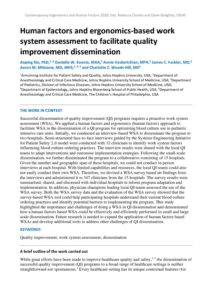| Document | Author Anping Xie, PhD, Danielle W. Koontz, MAA, Annie Voskertchian, MPH, James C. Fackler, MD, Aaron M. Milstone, MD, MHS, and Charlotte Z. Woods-Hill, MD |
| Abstract Successful dissemination of quality improvement (QI) programs requires a proactive work system assessment (WSA). We applied a human factors and ergonomics (human factors) approach to facilitate WSA in the dissemination of a QI program for optimising blood culture use in pediatric intensive care units. Initially, we conducted an interview-based WSA to disseminate the program to two hospitals. Semi-structured face-to-face interviews guided by the Systems Engineering Initiative for Patient Safety 2.0 model were conducted with 32 clinicians to identify work system factors influencing blood culture ordering practices. The interview results were shared with the local QI teams to adapt interventions and customise implementation strategies. Following the small-scale dissemination, we further disseminated the program to a collaborative consisting of 15 hospitals. Given the number and geographic span of these hospitals, we could not conduct in-person interviews at each hospital. With limited capabilities and resources, the local QI teams could also not easily conduct their own WSA. Therefore, we devised a WSA survey based on findings from the interviews and administered it to 347 clinicians from the 15 hospitals. The survey results were summarised, shared, and discussed with individual hospitals to inform program adaptation and implementation. In addition, physician champions leading local QI teams assessed the use of the WSA survey. Both the WSA survey data and the evaluation of the WSA survey showed that the survey-based WSA tool could help participating hospitals understand their current blood culture ordering practices and identify potential barriers to implementing the program. This study highlighted the importance and challenges of doing a WSA in QI dissemination and demonstrated how a human factors based WSA could be effectively and efficiently performed in small and large scale dissemination. Future research is needed to expand the application of human factors based WSAs and develop additional tools to address other challenges of QI dissemination. |

